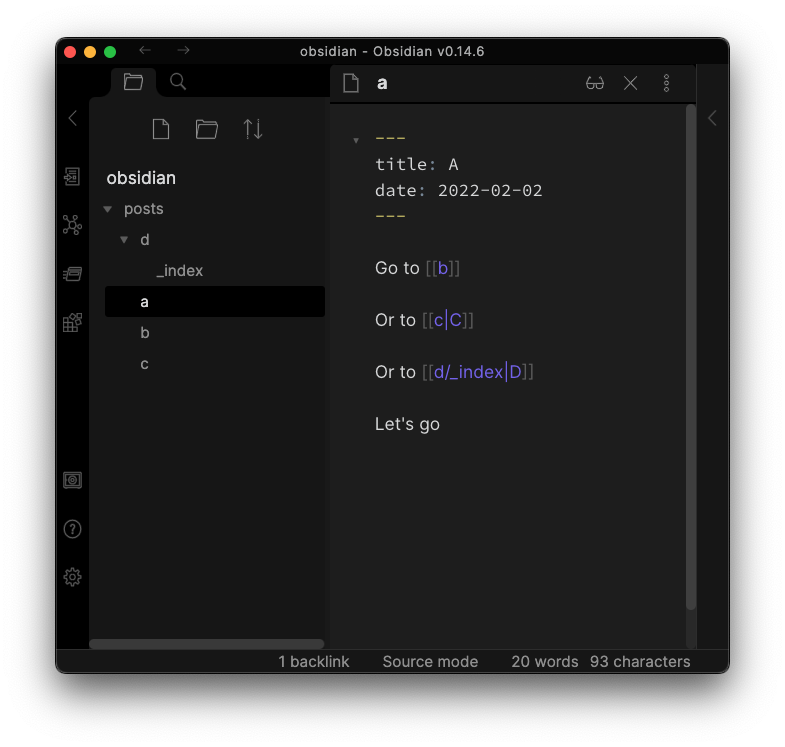https://github.com/devidw/obsidian-to-hugo
Process Obsidian notes to publish them with Hugo. Supports transformation of Obsidian wiki links into Hugo shortcodes for internal linking.
https://github.com/devidw/obsidian-to-hugo
blogging cli hugo hugo-helper obsidian obsidian-community obsidian-hugo obsidian-md obsidian-notes obsidian-processor obsidian-publish obsidian-vault obsidianmd personal-knowledge-management processing python python-cli replace-text replacement
Last synced: 6 months ago
JSON representation
Process Obsidian notes to publish them with Hugo. Supports transformation of Obsidian wiki links into Hugo shortcodes for internal linking.
- Host: GitHub
- URL: https://github.com/devidw/obsidian-to-hugo
- Owner: devidw
- License: mit
- Created: 2022-03-12T13:50:25.000Z (over 3 years ago)
- Default Branch: main
- Last Pushed: 2023-03-21T15:45:00.000Z (over 2 years ago)
- Last Synced: 2025-03-28T13:03:56.148Z (6 months ago)
- Topics: blogging, cli, hugo, hugo-helper, obsidian, obsidian-community, obsidian-hugo, obsidian-md, obsidian-notes, obsidian-processor, obsidian-publish, obsidian-vault, obsidianmd, personal-knowledge-management, processing, python, python-cli, replace-text, replacement
- Language: Python
- Homepage: https://obsidian-to-hugo.wolf.gdn
- Size: 1.1 MB
- Stars: 370
- Watchers: 1
- Forks: 29
- Open Issues: 6
-
Metadata Files:
- Readme: README.md
- License: LICENSE
Awesome Lists containing this project
- my-awesome-github-stars - devidw/obsidian-to-hugo - Process Obsidian notes to publish them with Hugo. Supports transformation of Obsidian wiki links into Hugo shortcodes for internal linking. (Python)
- jimsghstars - devidw/obsidian-to-hugo - Process Obsidian notes to publish them with Hugo. Supports transformation of Obsidian wiki links into Hugo shortcodes for internal linking. (Python)
README

Obsidian Vault to Hugo Content
Lightweight, extensible, zero-dependency CLI written in Python to help us publish [obsidian](https://obsidian.md) notes with [hugo](https://gohugo.io).
It only takes two arguments: The obsidian vault directory (`--obsidian-vault-dir`) and the hugo content directory (`--hugo-content-dir`).
```console
python -m obsidian_to_hugo --obsidian-vault-dir= --hugo-content-dir=
```
It takes care of the following steps:
- Clears hugo content directory (directory will be deleted and recreated)
- Copies obsidian vault contents into hugo content directory (`.obsidian` gets removed immediately after copying)
- Replaces obsidian wiki links (`[[wikilink]]`) with hugo shortcode links
(`[wikilink]({{< ref "wikilink" >}})`)
- Replaces obsidian marks (`==important==`) with HTML marks (`important`)
- Want to do more? You can write and register custom [filters](#filters) to dynamically
include/exclude content from processing and [processors](#processors) to do whatever
you want with the file contents.
## Replacement examples
| Obsidian | Hugo
| -------- | --------
|  | 
| `[[/some/wiki/link]]` | `[/some/wiki/link]({{< ref "/some/wiki/link" >}})`
| `[[/some/wiki/link\|Some text]]` | `[Some text]({{< ref "/some/wiki/link" >}})`
| `[[/some/wiki/link/_index]]` | `[/some/wiki/link/]({{< ref "/some/wiki/link/" >}})`
| `[[/some/wiki/link#Some Heading\|Some Heading Link]]` | `[Some Heading Link]({{< ref "/some/wiki/link#some-heading" >}})`
| `==foo bar===` | `foo bar`
> **Note**
> For now, there is *no way to escape* obsidian wiki links. Every link
> will be replaced with a hugo link. The only way to get around this is changing
> the wiki link to don't match the exact sytax, for example by adding an
> [invisible space](https://en.wikipedia.org/wiki/Zero-width_space) (Obsidian will highlight the invisible character as a red dot).
> 
> However, this still is really really *not* best
> practice, so if anyone wants to implement real escaping, [please do
> so](https://github.com/devidw/obsidian-to-hugo/pulls).
## Installation
```console
pip install obsidian-to-hugo
```
## Usage
```console
usage: __main__.py [-h] [--version] [--hugo-content-dir HUGO_CONTENT_DIR]
[--obsidian-vault-dir OBSIDIAN_VAULT_DIR]
options:
-h, --help show this help message and exit
--version, -v Show the version and exit.
--hugo-content-dir HUGO_CONTENT_DIR
Directory of your Hugo content directory, the obsidian notes
should be processed into.
--obsidian-vault-dir OBSIDIAN_VAULT_DIR
Directory of the Obsidian vault, the notes should be processed
from.
```
## Python API
```python
from obsidian_to_hugo import ObsidianToHugo
obsidian_to_hugo = ObsidianToHugo(
obsidian_vault_dir="path/to/obsidian/vault",
hugo_content_dir="path/to/hugo/content",
)
obsidian_to_hugo.run()
```
### Filters
You can pass an optional `filters` argument to the `ObsidianToHugo`
constructor. This argument should be a list of functions.
The function will be invoked for each file from the obsidian vault that is
copied into the hugo content directory.
Inside the function, you have access to the file path and the file contents.
When the function returns `False`, the file will be skipped and not copied
into the hugo content directory.
```python
from obsidian_to_hugo import ObsidianToHugo
def filter_file(file_contents: str, file_path: str) -> bool:
# do something with the file path and contents
if your_condition:
return True # copy file
else:
return False # skip file
obsidian_to_hugo = ObsidianToHugo(
obsidian_vault_dir="path/to/obsidian/vault",
hugo_content_dir="path/to/hugo/content",
filters=[filter_file],
)
obsidian_to_hugo.run()
```
### Processors
You can pass an optional `processors` argument to the `ObsidianToHugo`
constructor. This argument should be a list of functions.
The function will be invoked for each file from the obsidian vault that is
copied into the hugo content directory. It will be passed the file contents
as string, and should return the processed version of the file contents.
Custom processors are invoked after the default processing of the file contents.
```python
from obsidian_to_hugo import ObsidianToHugo
def process_file(file_contents: str) -> str:
# do something with the file contents
return file_contents
obsidian_to_hugo = ObsidianToHugo(
obsidian_vault_dir="path/to/obsidian/vault",
hugo_content_dir="path/to/hugo/content",
processors=[process_file],
)
obsidian_to_hugo.run()
```
